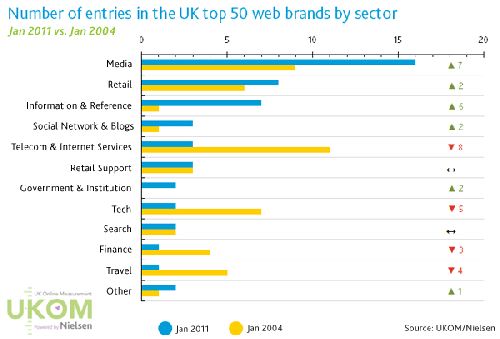Branded goods
The online world is increasingly reflecting the offline world as a growing number of the UK's top 50 brands are ‘traditional' businesses, a new study found.
Acccording to a UKOM/Nielsen study of how the profile of the web's most-visited sites has changed since 2004, 35 of the web's top 50 brands are now social media or traditional offerings.
Names such as Freeserve, Lycos, Demon and Kelkoo, which once appeared among the web's elite have now been replaced in the Top 50 by brands such as Facebook, Twitter, Sky and John Lewis, the study found.
UKOM general manager James Smythe, said: "Over the last seven years, we see two broad developments: first, huge growth in the use of sites built on social content, where we mostly find contributions from people we trust; and second, websites with a high-street or ‘real-world' presence translating the strength of their offline brands into online audiences."
While all web users have been aware of the increasing presence of social media in recent years, the study found that in January 2004 there was just one social site, friends reunited, and now there are 10, if you count YouTube, tripadvisor and Wikipedia.
Intriguingly 18 of the top 50 sites had an established presence in ‘the real world' 7 years ago (Argos and the BBC for example) but this has now risen to 25.
"The web has always made it easier for people to feed their fundamental desire to socialise, but the critical element of trust in social online environments has now become mainstream. Likewise, traditional brands have successfully harnessed the trust and confidence consumers have had with their established businesses offline, by migrating them to their sites on the web," said Smythe.
Here is a chart showing brands by sector.

The Media has enjoyed the biggest rise in the number of entries into the UK top 50 web brands. In 2004 just 9 media firms made the cut but this number reached 16 in January 2011, with growth fuelled by TV broadcasters' OD offerings and traditional national newspapers.
Similarly, the rise in the number of Information & Reference brands in the Top 50 can largely be attributed to the rising popularity of social media and a growing acceptance by consumers of ‘anonymous authority' - trusting the provenance of unedited content uploaded by users unknown to them. The number has rocketed from a single site, Yell.com in January 2004 to 7 sites including Wikipedia and eHow, in January of this year.









